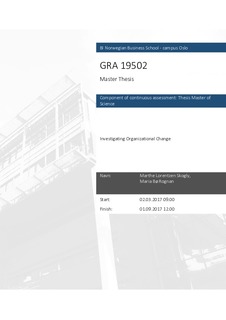Investigating organizational change
Master thesis

Permanent lenke
http://hdl.handle.net/11250/2485990Utgivelsesdato
2017Metadata
Vis full innførselSamlinger
- Master of Science [1621]
Sammendrag
In today’s business world, most organizations have to change in order to meet the
required demands from their surrounding environments, e.g. because of
opportunities for growth, economic trends, consumer needs or new technologies.
Most organizations have settled with the phrase “change or die”, which constitutes
the importance of the changing. However, change is difficult to pull off, and most
change processes ends in failure do to errors related to the implementation. It is
important to understand which factors that can influence a change process, in order
to enhance the possibility for successfully implement change.
In this thesis we examine an organizational change process faced by the Norwegian
consulting firm, Scandinavian Technology Institute. They have recently been
acquired by Solar Group, and are now restructuring their business and
implementing Solar’s knowledge arena, STI Services. By taking a qualitative
approach, we investigate how the factors knowledge sharing, organizational culture
and internal communication influence the change process, and why they are of
importance.
Overall, we find that knowledge sharing influences how the merging companies can
benefit from each other’s competencies and resources, and improve their chances
for succeeding in implementing change. We also find that the organizational culture
is open and informal, and that it determines whether the change can be successfully
implemented or not. Furthermore, find that internal communication is crucial in
communicating the change vision, and develop commitment and motivation among
the employees.
We further find that the factors we study influence each other. We find that
knowledge sharing can contribute to improving the organizational culture, making
a more positive and collective culture. At the same time, knowledge sharing can
enhance STI’s social capital and facilitate for interactions among employees,
resulting in the production of information, new practices and competencies.
Regarding their organizational culture, we find that knowledge sharing is affected
by underlying factors, such as reciprocity, relationships, and power, determining
whether they share and transfer knowledge. We also find that in order to cope with change, the internal communication has to be adjusted to the organizational culture
for the sake of creating a shared understanding about the change process. We further
find that organizational culture influence internal communication because it
requires a communication form that is adjusted to their culture. Furthermore, we
find that internal communication is important for enhancing knowledge sharing,
because it provides easy access to knowledge through common arenas, networking
and conversations. Finally, we find find that internal communication is essential in
developing a social community, group identity and in shared understanding of the
change process.
Beskrivelse
Masteroppgave(MSc) in Master of Science in Leadership and Organizational Psychology - Handelshøyskolen BI, 2017